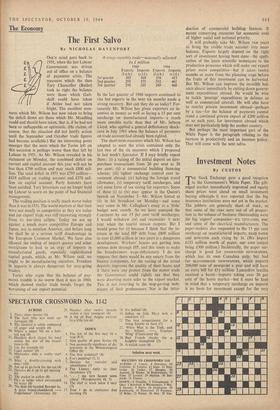The Economy
The First Salvo
By NICHOLAS DAVENPORT ONE'S mind goes back to 1951, when the last Labour Government was driven out of office on a balance of payments crisis. The measures which the then Tory Chancellor (Butler) took to right the balance were those which Gait- skell could have taken if Attlee had not taken fright. The excellent mea- sures which Mr. Wilson has now taken to bring the deficit down are those which Mr. Maudling could and should have taken, that is, if he had not been so unflappable or optimistic. (He claims, of course, that the situation did not justify action until the September and October trade figures had become available.) But the interesting point emerges that the mess which the Tories left on this occasion is perhaps worse than that left by Labour in 1951. As Mr. Wilson revealed in his statement on Monday, the combined deficit on current and capital account this year will not be less than £700 million and may reach £800 mil- lion. The total deficit in 1951 was £795 million- £419 million on trading account and £376 mil- lion on capital account. Party honours have been satisfied. Tory historians can no longer hold up Labour to scorn on the point of bad financial management.
The trading position is really much worse today than it was in 1951. The world markets at that time were not nearly so competitive as they are today and our export trade was, still recovering strongly from its war-time eclipse. Today we are up against a much more competitive Europe and Japan, not to mention America, and before long we shall be at a serious tariff disadvantage in the European Common Market. We have also allowed the ending of import quotas and other restrictions to lead to an orgy of imports in manufactured goods, especially sophisticated capital goods, which, as Mr. Wilson said, we ought to be manufacturing ourselves. Freedom in imports is always dangerous for easy-going traders.
Tories who argue that the balance of pay- ments trouble is no worse than it was in 1960, which showed similar trade trends, forget the worsening of our export potential.
Average monthly trade-seasonally adjusted In £ million
1960 1964 Exports Imports Exports Imports (f.o.b.) (c.i.f.) (f.o.b.) (c.i.f.) 1st quarter .. 305 369 356 453
2nd quarter 295 375 352 461
3rd quarter 290 385 349 460 In the last quarter of 1960 imports continued to rise but exports in the next six months made a strong recovery. But can they do so today? For- tunately Mr. Wilson has given exporters an in- centive in money as well as laying a 15 per cent surcharge on manufactured imports-a much more sensible tactic than that of Mr. Selwyn Lloyd, who applied a general deflationary shock- cure in July 1961 when the balance of payments on trade account had already been righted.
The short-term measures which Mr. Wilson has adopted to meet the crisis contained only the last two of the six measures which I proposed
in last week's Spectator. If I may briefly repeat them : (i) a raising of the initial deposit on hire- purchase transactions from 20 per cent to 30 per cent; (ii) a commercial building licensing scheme; (iii) tighter exchange control over in-
vestment abroad; (iv) halving the foreign travel allowance; (v) temporary tariff surcharges, and (vi) some form of tax saving for exporters. Some of these (i) to (iv) may appear in the Queen's Speech on November 3-Mr. Wilson hinted at (ii) in his broadcast on Monday-and some may come in Mr. Callaghan's essay at a 'little' budget next month. As we have annoyed the Continent by our 15 per cent tariff surcharges, I would withdraw (iv) and reconsider it next year when the tourist season reopens. But I would press for (i) because I think that the in- crease in the total HP debt from £800 million to over £1,000 million in two years is a dangerous
development. Workers' homes are getting into serious debt through HP, and this tends to make the breadwinners wage-inflationary. I do not suppose that there would be any outcry from the finance companies, for the raising of the initial deposits improves the quality of their loans, and if there were any protest from the motor trade the Government could rightly say that they
were diverting more sales to the export market. This is not reverting to the stop-go-stop tech- niques of their predecessors. Nor is the intro- duction of commercial building licences. It means conserving resources for economic ends of higher social and national priority.
It will probably take Mr. Wilson two years to bring the visible trade account into near- balance. Exports largely depend on the right sort of investment having been done-the appli- cation of the latest scientific techniques to the production processes which will make our export prices more competitive-but it takes twelve months or more from the planning stage before the fruits of this investment can be harvested. But Mr. Wilson can improve the invisible bal- ance almost immediately by cutting down govern- ment expenditures abroad. He' would be wise to tackle 'prestige' expenditures in defence as well as commercial aircraft. He will also have to restrict private investment abroad-perhaps by a tax-for the balance of payments cannot stand a continual private export of £200 million or so each year, for investment abroad which does not particularly help the mother country.
But perhaps the most important part of the White Paper is the paragraph relating to the increase in productivity and an incomes policy. That will come with the next salvo.


































 Previous page
Previous page